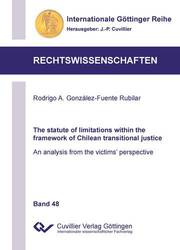| Departments | |
|---|---|
| Book Series (97) |
1382
|
| Nachhaltigkeit |
3
|
| Gesundheitswesen |
1
|
| Humanities |
2372
|
| Medienwissenschaften | 16 |
| Theology | 57 |
| Philosophy | 102 |
| Law | 423 |
| Economics | 853 |
| Social sciences | 417 |
| Sports science | 48 |
| Psychology | 233 |
| Educational science | 190 |
| History | 183 |
| Art | 111 |
| Cultural studies | 166 |
| Literary studies | 117 |
| Linguistics | 89 |
| Natural Sciences |
5408
|
| Engineering |
1798
|
| Common |
98
|
|
Leitlinien Unfallchirurgie
5. Auflage bestellen |
|
Advanced Search
The statute of limitations within the framework of Chilean transitional justice (Volume 48) (English shop)
An analysis from the victims’ perspective
Rodrigo A. González-Fuente Rubilar (Author)Preview
Extract, PDF (97 KB)
Table of Contents, PDF (100 KB)
Transitional Justice is increasingly consolidating as a legal framework directed at providing an answer as to how to deal with the serious violations of human rights committed during a warlike conflict or a dictatorship. In order to achieve this goal, transitional justice resorts to measures which must have the victim’s rights as a limit. The victim’s perspective is emphasized in the context of transitional justice due to the special characteristics of physical and psychological harm that they suffered during the constitutional break. Thus, victims’ rights constitute a schema of reference for determining the admissibility of a political measure enacted during the transition or the re-thinking of traditional legal institutions. It is precisely in this context that the statute of limitations must be questioned with regards to the criminal prosecution of core crimes.
| ISBN-13 (Hard Copy) | 9783954045396 |
| ISBN-13 (eBook) | 9783736945395 |
| Final Book Format | A5 |
| Language | English |
| Page Number | 262 |
| Lamination of Cover | matt |
| Edition | 1. Aufl. |
| Book Series | Reihen des Cuvillier-Verlages - Rechtswissenschaften |
| Volume | 48 |
| Publication Place | Göttingen |
| Place of Dissertation | Göttingen |
| Publication Date | 2013-10-30 |
| General Categorization | Dissertation |
| Departments |
Law
|
| Keywords | Transitional Justice, Victim’s rights, Statute of limitations, International Criminal Law, Core crimes, Chilean Dictatorships |








